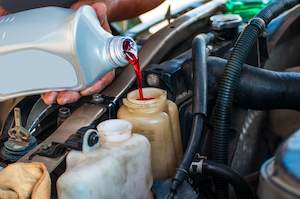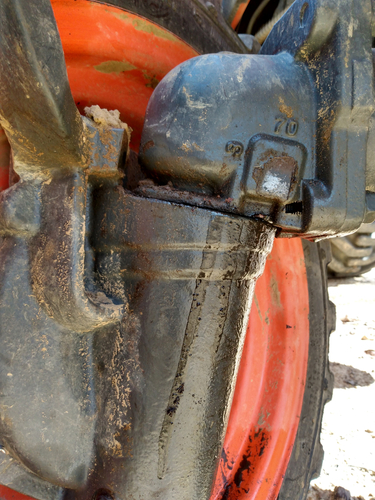What Is Hydraulic Fluid and Why Is It Important?

Figure 1: Hydraulic fluid is essential for the proper operation of various machines, including vehicles.
Many machines use hydraulic systems, from heavy equipment in construction to car braking systems. Hydraulic fluid is crucial in transmitting power throughout the system, keeping the system cool, and lubricating moving parts. This article covers hydraulic fluid composition, properties, and importance in hydraulic systems. Also, this article covers how to maintain hydraulic fluid and prevent spills and leaks.
Table of contents
- What is hydraulic fluid made of?
- Hydraulic fluid properties
- Hydraulic fluid vs hydraulic oil
- How does hydraulic fluid work?
- Maintenance of hydraulic fluid
- Hydraulic fluid and surfaces
- FAQs
Check out our selection of hydraulic oils!
What is hydraulic fluid made of?
Hydraulic fluid typically consists of a base oil and various additives. The usual base oils are mineral oil-based, synthetic oil-based, or water-based. Normal additives are anti-wear agents, rust and corrosion inhibitors, and more.
Base oil types
- Mineral oil-based: Mineral oil-based hydraulic fluids are the most common due to their relatively low cost and good lubrication properties. However, this type of hydraulic fluid is susceptible to oxidation and thermal breakdown. Therefore, it is not suitable for high-temperature applications.
- Synthetic oil-based: Synthetic oil-based hydraulic fluids are created with chemically engineered compounds and have advantages over mineral oil-based hydraulic fluids. They resist oxidation and thermal breakdown and are suitable for high-temperature applications. Also, they have excellent low-temperature performance, so that they can be used in cold environments too. This type of hydraulic fluid is more expensive than mineral hydraulic fluids.
- Water-based: Water-based hydraulic fluids are a mixture of water and additives, such as glycols or esters. These fluids have good cooling properties and work well in high-temperature systems. However, water-based hydraulic fluids are unsuitable for systems with components susceptible to rust and corrosion.
Additive types
- Anti-wear agents: Anti-wear agents give a protective coating to metal surfaces, reducing the wear and tear of hydraulic components.
- Rust and corrosion inhibitors: Rust and corrosion inhibitors reduce the possibility of rust and corrosion forming in hydraulic systems.
- Viscosity improvers: Viscosity improves the viscosity index of hydraulic fluid, keeping viscosity stable across a wider range of temperatures.
- Antifoaming agents: Antifoaming agents minimize foam in hydraulic systems. Foam can reduce hydraulic pressure and damage system components.
- Detergents and dispersants: Detergents and dispersants prevent the buildup of depositions and contaminants in hydraulic systems.
- Seal swell agents: Seal swell agents prevent hydraulic seals from drying out and becoming brittle, maintaining their integrity.
- Anti-oxidants: Anti-oxidants protect against oxidative degradation. This degradation reduces fluid performance and service life.
Learn more about types of hydraulic fluids by reading our understanding hydraulic fluid types article.
Hydraulic fluid properties
Understanding the properties of hydraulic fluid ensures the correct fluid will be chosen for any given application:
-
Viscosity: The hydraulic fluid's viscosity determines how smoothly it flows through a hydraulic system and how adequately it provides lubrication. Common viscosity grades are:
- ISO VG: The ISO VG (viscosity grade) ranges from 2 to 1500. Higher numbers indicate higher viscosity.
- SAE: The SAE (Society of Automotive Engineers) viscosity grade is common in North America. The scale is 10 to 60. Higher numbers indicate higher viscosity.
- AGMA: The AGMA (American Gear Manufacturers Association) viscosity grade is used for industrial gear lubricants. The scale ranges from 1 to 8. Higher numbers indicate higher viscosity.
- ASTM: The ASTM (American Society for Testing and Materials) viscosity grade is used for hydraulic fluids in aviation. The scale ranges from 100 to 1500. Higher numbers indicate higher viscosity.
- Flash point: The flash point is the temperature at which the fluid emits enough vapors to ignite. For safety reasons, fluids with high flash points are better.
- Pour point: The pour point is the temperature at which hydraulic fluid solidifies or thickens. In cold climates, choose fluids with lower pour points.
- Thermal stability: Synthetic and water-based hydraulic fluids have higher thermal stability than mineral oil-based hydraulic fluids.
Other properties, such as anti-wear, corrosion protection, and oxidation stability properties, are determined by the additives in the hydraulic fluid.
Hydraulic fluid vs hydraulic oil
While sometimes used interchangeably, hydraulic fluid and hydraulic oil are not the same. Hydraulic oil is a hydraulic fluid that is based on mineral oil. Hydraulic fluid is any type of fluid in a hydraulic system. Therefore, hydraulic oil is a type of hydraulic fluid.
How does hydraulic fluid work?
Hydraulic fluid's main function in hydraulic systems is to transmit power from one part of a system to another. It converts mechanical energy into hydraulic pressure, which is uniformly distributed throughout the fluid. The pressure can move pistons or cylinders, which in turn move other parts of the system.
Hydraulic fluid's power transmission ability comes from its non-compressible quality. It does not shrink or change shape easily when pressure is applied. Applying force to one end of a hydraulic system generates pressure, which travels through the fluid and can produce movement or power by activating hydraulic cylinders, motors, or valves.
To learn how hydraulic fluids work in specific applications, read our articles on hydraulic jacks and hydraulic pumps.
Maintenance of hydraulic fluid
With regular maintenance of hydraulic fluid, hydraulic systems will operate efficiently. The most common maintenance is checking the fluid level. Low hydraulic fluid symptoms include sluggish performance, strange noises, and leaks.
Changing hydraulic fluid
No matter which type of hydraulic fluid is in a system, it will eventually require changing. Changing hydraulic fluid involves draining the old fluid from the system and replacing it with new fluid.
Synthetic oil-based hydraulic fluids typically last longer than mineral oil-based and water-based hydraulic fluids. However, a hydraulic fluid's longevity depends on various factors, such as operating conditions and maintenance practices. In general, the hydraulic fluid should be changed every 1,000 to 2,000 hours of operation or as the manufacturer recommends.
Hydraulic fluid leaks
Hydraulic fluid leaks (Figure 2) can occur for reasons such as worn seals or damaged hoses. It's important to solve the issue as fast as possible to prevent system damage and the loss of hydraulic fluid. Dealing with hydraulic fluid leaks is an important aspect of hydraulic system maintenance.

Figure 2: Hydraulic fluid leaking from a front wheel assemblage
Hydraulic fluid and surfaces
Hydraulic fluid spills or leaks can be a challenging problem to deal with. Often, hydraulic fluid can get into clothes or on concrete surfaces.
How to get hydraulic fluid out of clothes
If hydraulic fluid gets on clothing, it must be cleaned off quickly to prevent a stain from setting.
- Blot the fluid with a clean cloth or paper towel. Do not rub the stain.
- Use a specialized cleaning agent meant for removing hydraulic fluid stains (e.g., isopropyl alcohol, acetone, or mineral spirits). Carefully follow instructions.
- Heat can permanently set the stain, so do not use hot water or put the clothing in a dryer.
How to remove hydraulic fluid from concrete
If hydraulic fluid gets on the ground, for example on a concrete surface, do the following:
- Contain the spill to prevent it from spreading.
- Use an absorbent material (e.g, clay or an absorbent pad) to soak up the fluid.
- Immediately dispose of used absorbent materials following local environmental regulations.
- Stubborn stains may require a pressure washer to clean.
The best method to avoid spills is regular maintenance of hydraulic systems to identify and prevent leaks. Also, personnel should be properly trained in hydraulic fluid safety and proper safety equipment, such as gloves and eye protection.
FAQs
What is hydraulic fluid used for?
The main function of hydraulic fluid is to provide energy transfer power between components in a hydraulic system, enabling work and motion.
Is hydraulic oil and hydraulic fluid the same thing?
Hydraulic oil is a mineral oil-based hydraulic fluid. Hydraulic fluid refers to various types of fluids, including synthetic oil-based and water-based as well.
What color is hydraulic fluid?
The color of hydraulic fluid can vary depending on its type and condition, but it is commonly amber or light yellow.
Does hydraulic fluid go bad?
Hydraulic fluid can go bad due to various factors such as contamination, oxidation, and depletion of additives.




